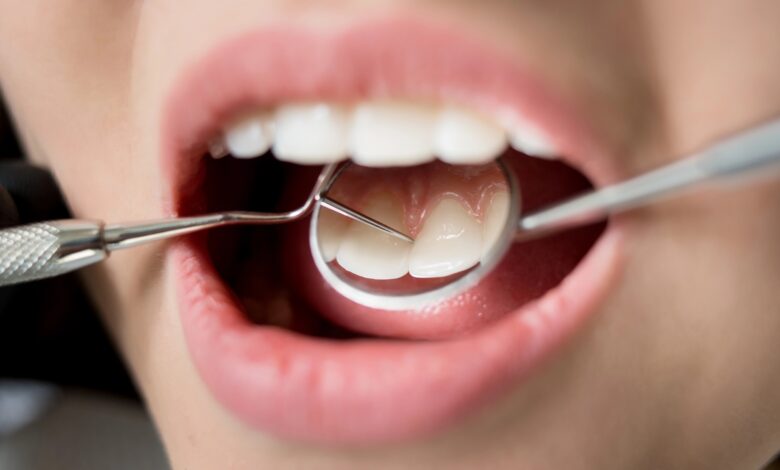Lab-grown teeth could be the future of dentistry

Researchers at King’s College London are on the brink of a groundbreaking discovery that could revolutionize the field of dentistry: lab-grown replacement teeth and fillings made from human cells. This innovative approach, inspired by a study published in ACS Macro Letters last year, aims to address the age-old problem of cavities and the limitations of traditional fillings.
Throughout history, mankind has sought solutions for tooth decay, with ancient civilizations using materials like bitumen, plant fibers, and beeswax to fill cavities. Modern dentistry has evolved to include synthetic materials such as alloys, amalgams, and composite resins for fillings. However, these solutions have their drawbacks, including weakening tooth structure, limited lifespan, and potential complications like decay or sensitivity over time.
Lead researcher Xuechen Zhang and his team have been exploring the potential of growing human teeth in the lab using organoids, but faced challenges in directing cells to communicate with each other effectively. Collaborating with experts at Imperial College, they discovered a novel approach using specialized three-dimensional matrices made with modified hydrogels to facilitate proper cell signaling and tooth development.
By releasing signals slowly over time, the new material mimics the natural process of cell communication in the body, paving the way for the creation of bioengineered teeth from mouse stem cells. The next phase of the research involves exploring methods to translate this success to human cells, with options ranging from transplanting young lab-grown cells directly into the mouth to growing entire teeth in the laboratory for implantation.
The potential benefits of lab-grown teeth are substantial, offering a more durable and biologically compatible alternative to traditional fillings or implants. These teeth would naturally integrate into the jaw, providing a stronger and longer-lasting solution with reduced risks of rejection. As Zhang envisions, lab-grown teeth have the potential to revolutionize dental care by providing a more sustainable and effective treatment option for patients.
In conclusion, the ongoing research at King’s College London represents a significant step towards transforming the way we approach dental care. By harnessing the power of bioengineering and stem cell technology, researchers are poised to offer patients a revolutionary alternative to conventional fillings and implants. The future of dentistry may soon be shaped by the promise of lab-grown replacement teeth, ushering in a new era of innovation and personalized dental solutions. There has been a recent surge in interest in sustainable living, with more and more people looking for ways to reduce their environmental impact and live more eco-friendly lifestyles. One of the key components of sustainable living is reducing waste, and one of the best ways to do this is by embracing the zero waste lifestyle.
The zero waste lifestyle is a philosophy that aims to eliminate all waste from our daily lives, or at least reduce it to a minimum. This means avoiding single-use plastics, opting for reusable alternatives, composting organic waste, and recycling as much as possible. By following the principles of zero waste living, individuals can significantly reduce their carbon footprint and contribute to a more sustainable future for our planet.
One of the key principles of zero waste living is to refuse single-use plastics. This means saying no to plastic bags, straws, water bottles, and other disposable items that contribute to the growing problem of plastic pollution. Instead, zero wasters opt for reusable alternatives such as cloth bags, stainless steel water bottles, and bamboo straws. By making these simple switches, individuals can drastically reduce the amount of plastic waste they generate on a daily basis.
Another important aspect of the zero waste lifestyle is composting. By composting organic waste such as fruit and vegetable scraps, coffee grounds, and eggshells, individuals can divert this waste from landfills and instead use it to nourish their gardens or houseplants. Composting is not only good for the environment, but it also helps to reduce greenhouse gas emissions and creates nutrient-rich soil that can help plants thrive.
Recycling is also a key component of the zero waste lifestyle. While recycling should not be seen as a solution to our waste problem, it is still important to recycle as much as possible to ensure that valuable resources are not wasted. By sorting and separating recyclables from other waste, individuals can help to reduce the amount of trash that ends up in landfills and incinerators.
Overall, the zero waste lifestyle is a holistic approach to living sustainably that encompasses all aspects of daily life. By following the principles of zero waste living, individuals can reduce their environmental impact, save money, and live a more mindful and intentional life. While it may take some time and effort to transition to a zero waste lifestyle, the benefits are well worth it for both individuals and the planet.





